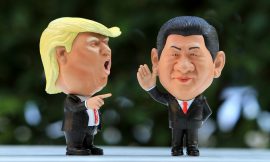In the midst of the economic war between China and the United States, a new, more discreet front has opened up: filmmaking. In a bid for influence, China has launched a bold strategy to develop its film industry. Is Chinawood supplanting Hollywood?
The Chinese film industry’s great leap forward
Movies are not just a leisure activity, they also impart values. Behind the entertainment factor hides a powerful vector of cultural influence. That is why states have always kept a close eye on film production even though it is in the private sphere. Cinema is well and truly a tool for “soft power”, which Joseph Nye defines as the ability to co-opt rather than coerce.
The American film industry wielded this power when, from 1945, it began projecting “the American way of life” as part of a strategy orchestrated directly from Washington. Another case in point: in 1946, U.S. Secretary of State James Byrnes reached an agreement with Leon Blum whereby France was required to show a quota of American films on its screens. Since then, American blockbusters have been getting top billing in French movie theatres…
But times are changing fast for the United States which, for nearly a century, was the world’s largest film market by far. Indeed, in 2020, China outperformed the United States, generating 3.13 billion in box office revenue versus 2.28 for the U.S. Since 2007, the number of movie theatres in China has grown twentyfold to more than 80,000, compared to just 41,000 in the United States. Driven by a domestic market of 1.4 billion consumers with increasing buying power and more time for leisure activities, cinema has bright days ahead – particularly Chinese cinema. Indeed, the number of Chinese productions has been multiplied by five in ten years and, today, 85% of productions shown and of box office revenue generated are domestic.
Chinawood, Hollywood’s big moneymaker
But the domestic market is not Beijing’s only focus. Just as the United States did in their time, China is looking to make cinema an instrument of influence. In this area, China’s cultural backwardness is obvious, while American films continue to hold an almost universal appeal. Wang Jianlin, the CEO of Wanda Pictures, one of the top Chinese production companies, made a sharp observation about this: “In ten years, the Chinese economy will be on [the] way to dethrone [the] US as [the] dominant economic power. But in terms of cultural power, China is still far behind.”
Wanda Pictures has become an essential element of China’s influence strategy. Originally founded as a real estate company, the Wanda Group went into film production after specialising in the construction of movie theatres. Through the acquisition in 2012 of the American chain AMC Theatres, Wanda became the world’s largest cinema operator. Continuing its development, the Group acquired the majority stake in the American studio Legendary Entertainment, producer of Interstellar and Christopher Nolan’s Batman films. This was the largest acquisition of an American media company by a Chinese firm. If the United States did not block these massive buyouts, it is because American cinema needs Chinese capital and that country’s market. Consider for example the Transformers trilogy co-produced by China: it was much more successful over there than in the United States, especially the last instalment, Transformers, the Last Knight (2017), which grossed 230 million dollars at the box office in China and just 130 in the United States. For the moment, China’s investment policy is akin to a form of win-win cooperation.
This is just a first step toward conquering the rest of the world’s movie theatres. Indeed, with the nod from Beijing, the self-same Wang Jianlin has launched a major project in Qingdao: the Movie Metropolis. Spanning the equivalent of 500 football fields, this complex cost 6.5 billion euros and now includes 30 studios. One of these covers 10,000 square metres, making it the world’s largest film studio. With these facilities, China plans to produce more films, for its domestic market but also for overseas. According to Mr Jianlin, this development “is a major measure to implement the national policy of building a cultural power” in China and on the world stage.
American cinema, China’s best ally?
This influence strategy is championed by the Chinese government and by its cultural organizations that work hand in hand. Beijing controls the entry of foreign films via a stringent policy of quotas: just 34 films may be imported each year. This enables China to stimulate its domestic industry while also limiting external influence. Foreign studios wanting a chance to release their productions in China must collaborate with a state-owned enterprise, the China Film Import and Export Corporation. The China Film Co-Production Corporation, on the other hand, oversees co-productions. Given the quota policy, American producers tend to opt for the latter solution to circumvent the restrictions on film imports. In any case, foreign studios are obligated to comply with the long list of standards imposed by Beijing if they wish to access the Chinese market. As a result, co-productions must feature Chinese actors, “appropriate and adequate” elements of culture, but they must also be set at least partly in China. Due to its dynamic market, China has discreet but real power over how the country is represented in major blockbusters.
Beijing now has enough power that it can modify the scenarios of major Hollywood motion pictures to present a positive image of the country or show its adversaries in a more negative light. Examples of this abound. For instance, in Iron Man 3, a three-minute scene was added during which a Chinese surgeon saves the life of the hero, Tony Stark. In The Martian, it is thanks to the Chinese National Space Agency (CNSA) that the hero of the film is saved. In X-Men: Days of Future Past, it is the Chinese actress Fan Bingbing who enables the team of superheroes to fight the Sentinels by risking her own life. Conversely, in World War Z, the pathogenic virus does not come from China, as it does in the novel, but rather from… Taiwan!
As Joseph Nye says, the most powerful form of power is the most subtle, the one you do not sense. Beijing understands this and is now using American cinema to shape a positive image of China and the Chinese. The stroke of genius is to have Hollywood show them at their best advantage, rather than seeking to overrun movie theatres with Chinese productions…






